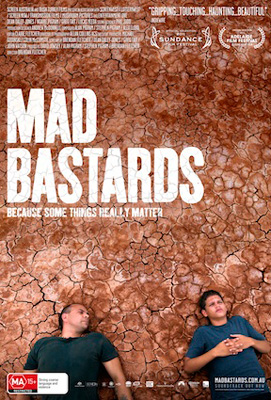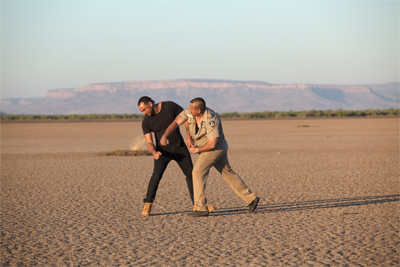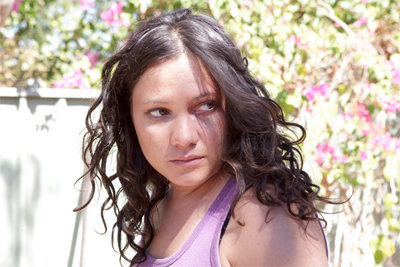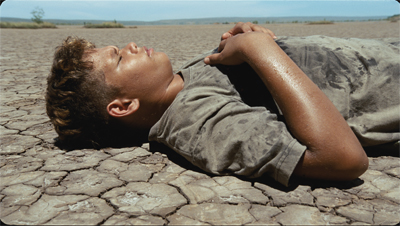Mad Bastards

Mad Bastards
Cast: Dean Daley-Jones, Lucas Yeeda, Greg Tait, Ngaire Pigram, Douglas Macale, John WatsonDirector: Brendan Fletcher
Genre: Drama
Rated: MA15+ (Strong coarse language and violence)
Running Time: 96.5 minutes
Synopsis: Official Selection - Sundance Film Festival 2011
Closing Night Film - Adelaide Film Festival 2011
TJ is a tough, volatile man tortured by his own soul.
Fleeing a life of urban chaos in the city, and with few other options, TJ sets out on a 2,000- kilometre journey north to the remote Kimberley town of Five Rivers to find 13-year-old Bullet, the son he has never met.
In the rugged Kimberly, TJ locks horns with local police officer Texas, who has family troubles weighing heavily upon him. He has just driven his grandson - Bullet - to a boys' camp in the bush to save him from being locked up after he lit a dangerous fire in Five Rivers. Fiercely protective of his community, Texas doesn't like the look of TJ and doesn't want him in his town. He has to fight to keep a lid on his anger when he realises that TJ fathered Bullet. After years of partying, Bullet's mother Nella has now cleaned up her life, but still feels real resentment towards TJ due to his long absence. This fuels his volatility. But Nella doesn't stand in the way of Bullet, when he returns from the bush camp, getting to know his father - she knows this is what her son wants.
Eventually TJ's old ways surface and his anger boils over, sparking a meltdown in Bullet. Texas is furious and the two huge men clash violently, out on the endless River Rivers floodplain.
Texas offers a beaten and bloody TJ the chance for redemption and he accepts - deciding to stay in the community with his family.
Release Date: May 5th, 2011
Website: www.madbastards.com.au
Rugged, Real, Inspirational
"A mad bastard is our name for the one who is dragging the net in the deep end where the crocodiles are. They are brave to the point of being mad. We were all mad at some point, especially when we were young and full of stupidity because we'd been drinking." -Stephen Pigram, producer, composer, member of the renowned Pigram Brothers.
"I am really proud of this movie most of all because it does justice to the tough men of The Kimberley who have transformed their lives by tempering their wildness, and channeling their strength into their kids, their families, their communities. I find that very real and very inspiring." - Brendan Fletcher, director, writer, producer.
"TJ has hit rock bottom but is striving to get back on his feet. It is a positive story. A lot of people aren't educated and don't read but they watch movies." - Dean Daly-Jones, who plays TJ, father of Bullet.
"There's not much fake in the film. It is pretty real. If anything we played it down a bit." - Greg Tait, who played Texas, the police officer and grandfather of Bullet, while he was actually employed as the local police officer at the remote town of Hall's Creek.
"There's something up here that Aboriginal people have: a magic, a sixth sense, a connectedness. Uncle Black represents it in the film but it was one of the hardest things to get into the movie because it's not physical." - Alan Pigram, producer, composer, grip, member of the renowned Pigram Brothers.
 A Unique Production Process
A Unique Production ProcessThe actors brought their own lives to the screen
Mad Bastards tells a story about the tough, primal men who live in one of Australia's last frontiers, The Kimberley. There is a simple explanation behind its authenticity: the people in the lead roles brought their own lives to the story and basically play themselves.
Greg Tait, the police officer Texas on screen, was the local copper at remote Hall's Creek for nearly 17 years. Dean Daley-Jones, the tough angry TJ that arrives in town to meet his son for the first time, is currently getting to know his own teenage son in real life. When the cameras film John Watson taking a group of troubled boys deep into the bush to teach them Aboriginal culture, it feels natural because it's what Johnnie does all the time. "There's not much fake in the film," says Greg Tait who, like Dean Daly-Jones and John Watson, is credited as writer in collaboration with director Brendan Fletcher. "It is pretty real. If anything we played it down a bit."
"In most films actors act out the script but in this film we accommodated the actors," laughs Stephen Pigram, one of the four producers on Mad Bastards. "We said 'You tell us your story and we will write it into what we're doing'. We wanted to show this part of the world and capture the kind of characters that this part of the world breeds."
"A mad bastard is our name for the one who is dragging the net in the deep end where the crocodiles are. They are brave to the point of being mad. We were all mad at some point, young and full of stupidity because we'd been drinking.
Stephen Pigram has lived in The Kimberley all his life. This vast, remote, rugged, spectacular northwest corner of Australia is central to the film.
Stephen Pigram and his brother Alan Pigram, another of the film's producers, are members of the Pigram Brothers, a country, folk, blues band from Broome, the biggest town in The Kimberley. They and Brendan Fletcher were the creative core of the film from the outset. Along with producer David Jowsey. David Jowsey has a long history of producing and commissioning Indigenous film and Television productions. He had worked in Broome on a number of productions including producing the "Stompem Ground" music concerts, which featured the Pigram Brothers, and this relationship developed into supporting development of Mad Bastards over a number of years, before joining the team as Producer.
"We put messages in the film and one of them is the importance of men looking after their families," says Stephen Pigram. "There seems to be men's groups springing up everywhere. It seems everyone is battling to define what an Australian male is, let alone an Aboriginal male."
It all started with a fishing trip
In 1996 Brendan Fletcher found himself talking on the phone for the first time to Stephen Pigram, one of the seven brothers that make up The Pigram Brothers.
"I heard they were looking for some music videos," Brendan Fletcher recalls. "I remember Stephen Pigram saying 'We can't afford to pay you and I can't even put you up in a hotel because I only live in a tin shed, but we could take you fishing'. Long before I knew anything about anything I loved fishing and camping, so I was in. During the trip we conceived, shot and cut two music videos in two weeks and they are still two of the best things I've ever done."
Brendan Fletcher grew up thousands of kilometres away in a white middle-class family in the heart of Sydney, Australia's biggest city. He had no older siblings.
"I was two years younger than the youngest Pigram brother and suddenly I had nine older brothers (two are not in the band). Meeting them was when the world changed for me. My relationship with Australia changed: I crossed to the other side and never really came back."
The Kimberley is now Brendan Fletcher's second home and he has created a range of music-orientated productions for and with "the piggies", including several documentaries, inspirational educational resources for young people in outback communities, and Kulli Foot, a critically acclaimed 10-minute drama shown on ABC TV. David Jowsey was an Executive Producer at ABC TV at the time and he commissioned a number of the early documentary collaborations between Brendan Fletcher and the Pigram brothers for television.
These men were a movie waiting to happen
"Again and again I would meet men who had incredible toughness and also a compelling presence," says Brendan Fletcher about his early years in this frontier of Australia. "Around the campfire they told amazing stories about their lives and later I'd hear just how wild they used to be. But I knew them as men who hadn't had a drink for 20 years."
 He knew star power when he saw it: in 2001 he co-directed the feature-length documentary Texas with Russell Crowe, a film about Russell Crowe's band Thirty Odd Foot Of Grunt. "I thought that if these men could act they were a movie waiting to happen, so I started writing a story around them that I felt captured that world.
He knew star power when he saw it: in 2001 he co-directed the feature-length documentary Texas with Russell Crowe, a film about Russell Crowe's band Thirty Odd Foot Of Grunt. "I thought that if these men could act they were a movie waiting to happen, so I started writing a story around them that I felt captured that world."I am really proud of this movie most of all because it does justice to the tough men of The Kimberley who have transformed their lives by tempering their wildness and channeling their strength into their kids, their families, their communities. I find that very real and very inspiring."
Giving up alcohol was often the catalyst. Colonization first eroded traditional Aboriginal law and culture; alcohol further eroded it. But alcohol is a problem in many societies throughout the world, not just in Aboriginal societies.
There is a cultural underpinning to Mad Bastards; and a subtlety that goes much deeper than the story, that only Kimberley people may understand.
"There's something up here that Aboriginal people have: a magic, a sixth sense, a connectedness," says Alan Pigram. "Uncle Black represents it in the film but it was one of the hardest things to get into the movie because it is not physical."
The film was made organically, collaboratively.
Brendan Fletcher recorded hours and hours of stories over many years as he travelled up and down The Kimberley with the Pigrams. They all fed into the film. With the help of many confidantes and collaborators, gradually a narrative took shape.
Brendan Fletcher didn't set out to make a father-and-son story but that's what it became. He would read drafts of the script aloud to the men, mothers, aunties, kids, and whoever else was around the campfire at the time. He was rigorous about making it true to the place and the people.
"It was never an option for me to write a movie script and get people to act in it," says Brendan Fletcher. "It is not interesting what I thought. It was about what the men that I met in The Kimberley thought, what had happened to them, what they wanted to make a movie about."
"A mate of mine told Brendan Fletcher to come and see me and all I knew was that he wanted to hear real stories from The Kimberley, not prettied up ones," says Greg Tait, who was cast in the starring role of police officer Texas because of the strength of a screen test. " We all had a part in how the movie was made. Along the way Brendan Fletcher would ask us all questions about the direction he wanted to take the script."
When other key cast came on board, they too added life experiences that were already etched on their faces. Dean Daly-Jones can remember being given a wooden toy one Christmas by his mother's then boyfriend. At the beginning of Mad Bastards his character, TJ, goes to the jail to visit his brother, who has made a wooden toy for his son and wants TJ to deliver it. On a much larger scale, the transformation the audience expects from TJ by the end of the film, mirrors the transformation Dean Daly-Jones still sometimes struggles with.
"I only became a man when I addressed my demons about three years ago but the devil was still trailing me," says Dean Daly-Jones. "Friends and family say it is amazing what the film has done for me. When I hear people being racist now I talk to them, not try to beat their heads in as I once would have.
"I am a proud Nyoongar man and when Brendan Fletcher approached me I had to read the script because I wasn't going to get involved in something that would exploit us blackfellas or have a poor-fellow-me tone. TJ has hit rock bottom but is striving to get back on his feet. It is a positive story. A lot of people aren't educated and don't read but they watch movies."
Lucas Yeeda, who plays the youngest of the film's mad bastards, also made a major contribution to the script. One day after calling action, Brendan Fletcher suddenly realised he hadn't thoroughly briefed Lucas Yeeda about what his character should say. It was a scene involving a group of wayward boys who were being taken on a camp so they could reconnect with their culture and country. With the cameras rolling, John Watson, an elder, asked each of them in turn what trouble they had got into. 'I lit a fire,' were the words Lucas Yeeda chose to put in Bullet's mouth. On the strength of this, Brendan Fletcher later filmed Lucas Yeeda setting fire to a building with a Molotov cocktail and these dramatic night-time scenes open the film.
Improvisation is a necessity in The Kimberley
After years of writing and planning, cameras rolled in June 2009. Most of the filming occurred in The Kimberley, a 400,000square kilometre region in the northwest corner of Australia. It is thousands of miles to the nearest capital city and is very sparsely populated.
"Being born into an isolated place like The Kimberley, with little infrastructure, means you are used to improvising and fending for yourself," says Stephen Pigram. His brother Alan Pigram, for example, made several of the camera rigs and dollies used on the film from materials he had lying around. Everybody chipped in and did everything: Alan Pigram was a producer, a composer and the grip, but could often be found welding his handiwork.
There were two significant periods of filming with six months of editing and re-scripting between them to ensure that the story being told and the way it was being told was authentic. Much of what was said on set were not words set in stone in a script, but words that reflected what the actors knew was the intention of the scene from the workshops and rehearsals.
"On set Brendan Fletcher would sometimes ask me 'Does that look like how a real person would react?' says Greg Tait. "Whenever I was acting in a scene I would speak to the other actors and give them a pep talk, telling them to pretend the camera wasn't there, to not try and be someone, to just be themselves."
The improvised filming process was both exciting and nerve wracking for producer David Jowsey - "but once I saw the performances in the rushes I knew we had something authentic and powerful"
Pigram Brothers music is the music of the Kimberley
Four of the seven members of The Pigram Brothers, and other musicians too, are seen performing in Mad Bastards.
Alan Pigram and Stephen Pigram and Alex Lloyd compose and perform the film's music. The soundtrack also includes Pigram Brothers music from more than 10 years ago, music from the band Scrap Metal, and the brilliance of Kasey Chambers and Native American rap performer Aki Redbird.
 "Our music represents The Kimberley and we wanted to utilise all the other musicians that live in The Kimberley too but came to understand that would be too hard," says Alan Pigram.
"Our music represents The Kimberley and we wanted to utilise all the other musicians that live in The Kimberley too but came to understand that would be too hard," says Alan Pigram. "Working with Alex Lloyd gave our music a different twist, made it more global. The music is sparse but is the glue that connects country and character. I want to say its folksy but it is its own sound. It is very hard to define. It is very acoustically driven."
As with the rest of the film, the process of creating the soundtrack was very organic. When Stephen Pigram was on the road with Brendan Fletcher, auditioning men from the vast Kimberley region, he would often pull out his ukulele and compose a song there and then, recording the essence of the country on a small digital player. Several of those actual recordings are on the film's soundtrack. Attempts were made to re-record them but the originals were judged better - and better suited the film.
MORE



